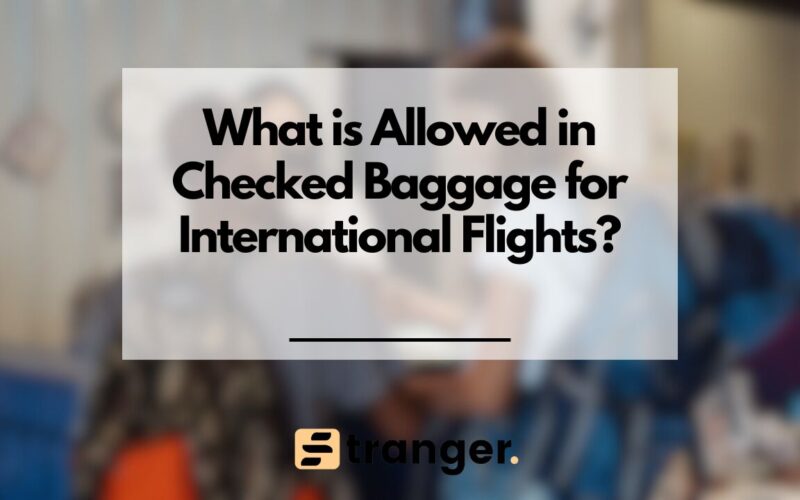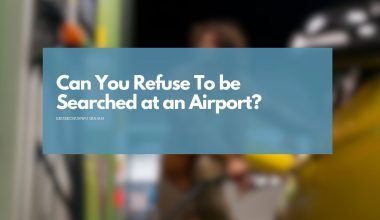As an Amazon Associate, I earn a small commission from qualifying purchases. Learn more about this.
While storing your checked baggage in the cargo hold of the plane, you need to be aware that there are restrictions to what you can actually pack inside.
Compared to your carry-on luggage which usually contains your personal items, toiletries and essentials, there are some items you should not put inside your checked baggage during a flight.
Most of these items include flammable items, hazardous materials, other prohibited items and your smartphones.
You might be wondering why an ordinary smartphone could be included, but yes, it can.
Keep on reading to find out why and other related items that could get you in trouble if put inside checked baggage.
What Is Allowed In Checked Baggage For International Flights?
First and foremost, let’s dive into the list of Items that are allowed in checked baggage during a flight.
Most of the time, the items allowed in checked baggage would usually depend on the specific airline you’re booking with. the total amount of weight of the items, size as well as class of travel.
But generally, these are the items that are allowed only in checked baggage for international flights.
1. Clothing and personal items
Passengers are permitted to put their personal items in their checked bags. Items like this include clothing, hats, personal hygiene items, toothpaste, shoes, socks, deodorant and so much more.
2. Food Items
Generally, you can store almost all kinds of food items in checked baggage compared to carry-on bags.
Examples of food items you can bring on board in your checked baggage include solid food items, like canned foods, cereals, bottled water, breast milk, toddler drinks, formula, baby food and even alcoholic beverages.
Of course, you can bring on alcoholic beverages but only to a certain limit.
Alcoholic beverages with more than 70% alcohol are prohibited.
3. Sharp Items
Almost all sharp objects are allowed in checked baggage, but they must be securely wrapped tightly in order to prevent injuries.
Some examples of sharp objects that are not prohibited include knives, saws, crochet hooks, disposable razors, knitting needles, ice axes and many more.
4. Electronics
Most electronics can be carried along in checked baggage by passengers and any electronic device with lithium batteries that has 100-watt hours or less capacity is allowed.
The unprohibited devices allowed include laptops, cell phones, DVD players, full-sized video game consoles, extension cords, coffee/espresso makers, PlayStation, microwaves or navigation GPS.
It’s worth mentioning any device with a lithium battery capacity of more than 100-watt hours is prohibited on checked baggage.
5. Medical Kits and equipment
Any medical kits and equipment ranging from inhalers to crutches and EpiPens are all generally allowed in checked baggage.
However, medications are also allowed but it’s recommended that you carry them in a carry-on bag rather than in checked bags.
6. Sporting and camping equipment:
Most sporting equipment is allowed. This includes anything from balls to arrows and to gloves.
You can’t actually put most of these items in the carry-on bags, they belong to the checked baggage.
Kindly note that some sporting items like bear bangers and bear spray won’t be allowed.
What Is Not Allowed In Checked Baggage For International Flights?
Before arriving at the airport, it’s also important that you know what you should not pack in a checked bag.
Here is the list of items that are generally not allowed in checked baggage for international flights, irrespective of the airline
1. Electronic devices and lithium batteries
If you have any devices or electronics that contain lithium metal batteries, you should be careful with them.
Any device containing lithium batteries with more than 100 watt hours should not be packed in checked baggage. But rather they are allowed in carry-on bags.
There are a few reasons behind this and it includes dangers like being liable to explode.
For instance, it’s not advisable to put a Samsung Galaxy Note 7 device in checked baggage, because it has the potential to get caught fire if a spark occurs.
2. Alcoholic beverages
Generally, alcoholic beverages are allowed on board and in checked bags. But alcoholic beverages that are over 140 proof are prohibited.
This simply implies that if a beverage contains more than 70% alcohol, it’s likely to be prohibited on checked baggage.
3. Explosives and flammable materials
Materials like this include butane, flammable paints, fire extinguishers, gunpowder, gasoline, flares, bang snap, and lights amongst others.
These items are dangerous and not allowed in checked bags. You should avoid packing any materials that are flammable in your checked or carry-on bags.
4. Weapons and Firearms
Ammunition is basically not allowed to be carried in checked bags, but some airlines have different rules regarding this.
If these are small arms ammunition, they can be securely packed in metal boxes or wood in order to carry them effectively.
This is why it’s important that you check with your airline before packing up your belongings.
Some airlines will let you unload only a small amount of firearms and declare them at check-ins.
5. Household tools and Valuables
Not all household tools are allowed in checked baggage, some include cordless curling Iron, butane curling Irons and cooking spray.
Avoid packing materials like this in checked bags. In addition to this, valuables such as jewellery, cash and important documents should not be in checked baggage.
Although it depends, it’s recommended that you place them in carry-on bags.
6. Illegal drugs
Aside from medications, any hard drugs are strictly prohibited whether in checked baggage or carry-on luggage.
Usually, you might get yourself in trouble if you are caught with any illegal drugs on board and can result in severe legal consequences.
Final Thoughts
Always remember to check with your airline in order to be aware of specific allowed and prohibited items in the airport.
There are several items prohibited by FFF regulations. Also, ensure that you pack your bags carefully in order to avoid any damage or misplacement.







